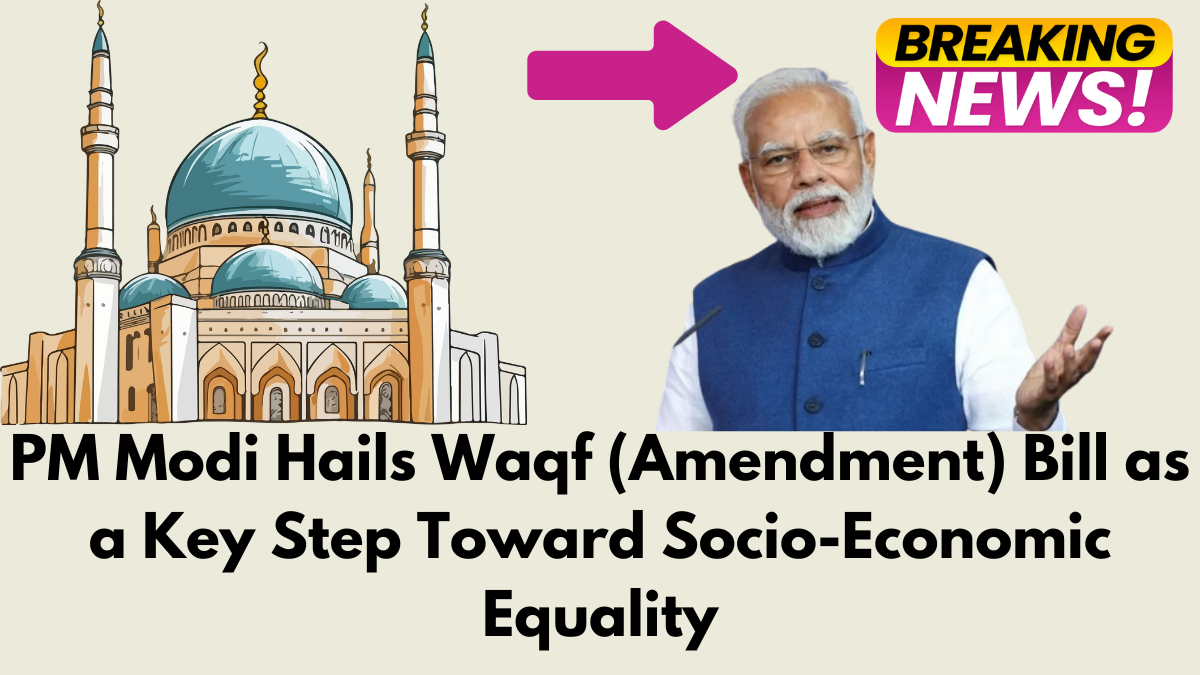The Indian Parliament has officially passed the Waqf (Amendment) Bill, 2025 and the Mussalman Wakf (Repeal) Bill, marking a significant legislative milestone. This development has been described by Prime Minister Narendra Modi as a “watershed moment” in India’s journey toward social-economic justice, transparency, and inclusive growth.
The passing of these bills aims to bring a modernized and transparent structure to the administration of Waqf properties, addressing long-standing concerns about accountability and fairness in their management. The changes are expected to particularly benefit marginalized communities, including Muslim women, economically weaker Muslims, and Pasmanda Muslims.

Prime Minister Modi’s Statement on the Reforms
Shortly after the bills were passed by both Houses of Parliament, Prime Minister Narendra Modi took to X (formerly Twitter) to express his views. He emphasized the importance of these legislations in ensuring transparency and safeguarding rights that were previously neglected.
“The passage of the Waqf (Amendment) Bill and the Mussalman Wakf (Repeal) Bill marks a watershed moment in our collective quest for social-economic justice, transparency, and inclusive growth. This will especially benefit individuals who have long been marginalized, depriving them of both representation and opportunities.,” the Prime Minister wrote.
He also extended his gratitude to the Members of Parliament who actively participated in discussions, offering their insights and suggestions. Additionally, he acknowledged the contributions of the general public who shared their inputs during the parliamentary committee’s deliberations, further strengthening the proposed reforms.
Addressing the Flaws of the Previous Waqf System
Prime Minister Modi pointed out that for decades, the Waqf system lacked transparency and accountability, which led to widespread mismanagement and misuse of properties meant for community welfare. This lack of oversight disproportionately affected vulnerable groups, particularly Muslim women and economically disadvantaged Muslims.
The newly passed legislations introduce a structured framework to ensure that Waqf properties are managed with greater responsibility, protecting the interests of the rightful beneficiaries. The government aims to build an inclusive and just India, where every citizen is treated with dignity and fairness.
The Voting Outcome and Parliamentary Debate
The bills were passed after lengthy and intense debates in both Houses of Parliament. The Rajya Sabha held a nearly 14-hour discussion, concluding with 128 members voting in favor and 95 against. Similarly, the Lok Sabha cleared the Waqf (Amendment) Bill well past midnight following a 12-hour-long debate.
During the discussions, Union Home Minister Amit Shah provided categorical assurances to the Muslim community, emphasizing that the new amendments do not interfere with religious practices but are solely intended to introduce fairness and transparency in governance.
Key Impacts of the Waqf (Amendment) Bill, 2025
| Aspect | Changes Introduced |
|---|---|
| Transparency | Improved oversight in Waqf property management |
| Accountability | Stricter regulations to prevent misuse |
| Protection of Rights | Safeguards for marginalized Muslim communities |
| Modernization | Updated legal framework for better administration |
| Inclusivity | Ensuring benefits reach all sections of society |
Moving Towards a Transparent and Inclusive Future
The passage of these bills marks the beginning of a new era where the Waqf system is governed by modern regulations designed to uphold fairness and efficiency. The reforms align with the government’s broader vision of creating a more inclusive and just society.
By prioritizing the dignity of every citizen, the government reinforces its commitment to ensuring that public resources are utilized for the greater good, benefiting those who have historically been marginalized.
Frequently Asked Questions (FAQs)
Q1: What is the primary objective of the Waqf (Amendment) Bill, 2025?
A: The bill aims to introduce greater transparency and accountability in the management of Waqf properties while ensuring that the rights of marginalized communities, including Muslim women and economically weaker Muslims, are protected.
Q2: Does this bill interfere with religious practices?
A: No, as stated by Home Minister Amit Shah, the legislation does not interfere with religious practices but focuses solely on enhancing governance and fairness.
Q3: Who will benefit from these legislative changes?
A: The reforms will benefit all sections of society, particularly marginalized Muslims, Muslim women, and those historically deprived of fair representation in Waqf property management.
Q4: How was the bill received in Parliament?
A: The bill was passed after extensive debates, with 128 members supporting it in Rajya Sabha and a majority vote in Lok Sabha.
Q5: What are the next steps after passing the bill?
A: The implementation phase will involve establishing clear guidelines to oversee Waqf property management, ensuring that the new laws are effectively enforced.
With this legislative reform, India moves closer to a system where resources meant for public welfare are utilized responsibly, reinforcing the principles of justice, fairness, and inclusivity in governance.
Click here to learn more
Akesh is a furniture expert with years of experience in design and craftsmanship. Specializing in sustainable materials, he shares his expertise to help people create stylish and functional living spaces.
